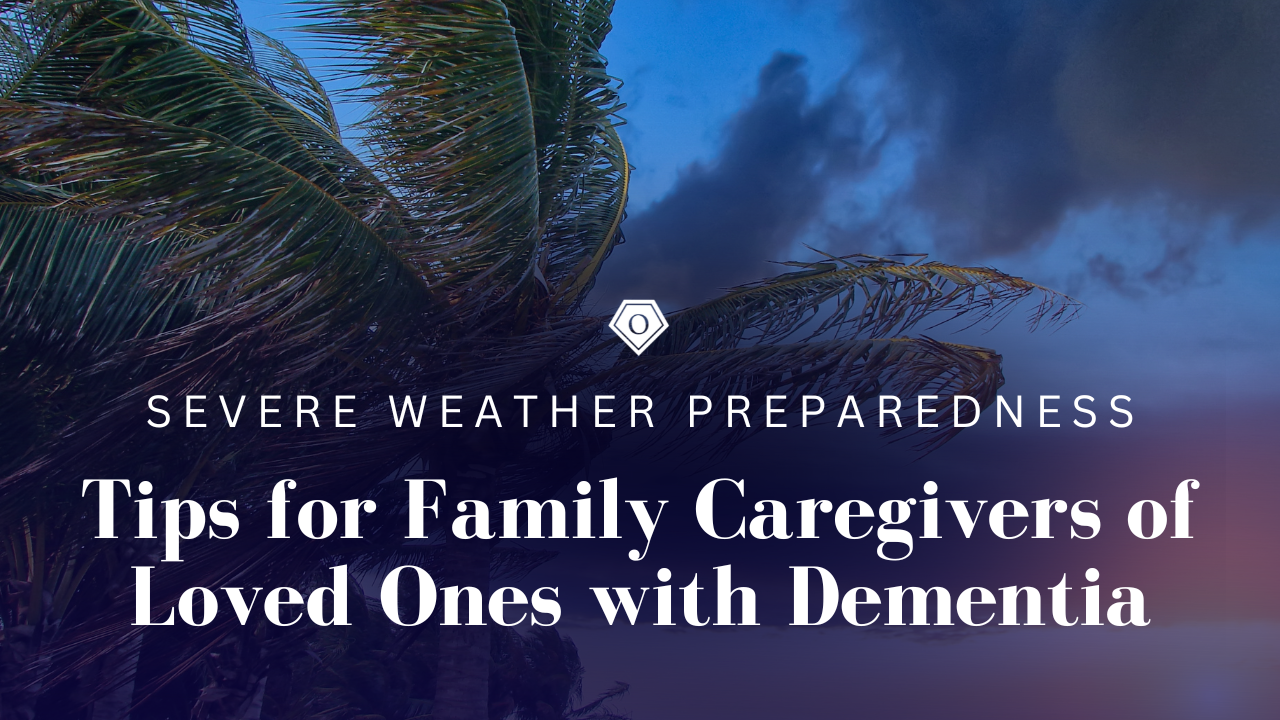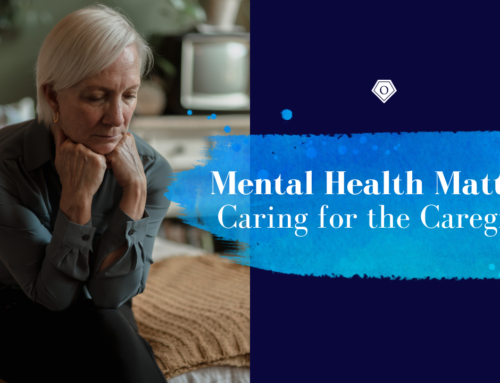Family caregivers need to take specific precautions when preparing for severe weather with a loved one who has dementia or Alzheimer’s. These steps can help ensure safety and minimize distress:
1. Create a Plan in Advance
- Involve medical professionals: Consult with your loved one’s doctor and home health care team to ensure you have medications, health records, and care instructions ready in case of an evacuation.
- Make a list of emergency contacts: Include family members, friends, and healthcare providers.
- Know your community’s disaster plan: Learn about local evacuation routes, shelters, and services for individuals with special needs.
2. Prepare an Emergency Kit
- Medications: Pack at least a week’s supply of medications, with copies of prescriptions.
- Important documents: Keep medical records, health insurance information, and identification.
- Basic supplies: Include non-perishable food, water, clothing, flashlights, and hygiene products.
- Comfort items: Bring familiar objects, such as photos or favorite items, that provide comfort and reduce anxiety.
- Assistive devices: Don’t forget any necessary items like glasses, hearing aids, walkers, or wheelchairs.
3. Minimize Confusion and Stress
- Stick to routines: Try to maintain familiar routines as much as possible during the evacuation or sheltering period.
- Reassure and distract: Be patient, and offer simple explanations. Use soothing tones and distractions like music or activities to keep them calm.
- Identification: Ensure they wear a medical ID bracelet or have identification on them in case they become separated.
4. Know Safe Locations
- Shelters: Research which local shelters or community centers accommodate individuals with dementia. Some may be quieter or more secure, which can help reduce confusion.
- Transportation: Plan how you’ll transport your loved one, whether by car or through community services. Make sure to account for mobility needs.
5. Prepare for Power Outages
- Backup power for medical equipment: If your loved one relies on medical devices, ensure you have a backup power source or know the location of nearby hospitals or facilities.
- Calm environment: Keep a calm and familiar environment during a power outage by using battery-powered lights and ensuring a steady supply of comforting items.
6. Communication During an Emergency
- Assign roles to family members: Make sure everyone knows their role, whether it’s packing supplies, staying with the loved one, or driving.
- Monitor weather updates: Stay informed about severe weather alerts through radios or phones, and be prepared to act quickly.
7. After the Disaster
- Return home safely: Once it’s safe to return, make sure the home is secure and free from hazards.
- Mental health support: Be aware that severe weather and evacuations may increase anxiety or confusion in someone with dementia. Seek professional help if needed.
By preparing in advance and maintaining calmness, caregivers can reduce the potential stress and confusion for their loved ones during severe weather events.
For Families Living Out of State with a Loved One Receiving Home Care in Volusia or Flagler Counties
When you live out of state and have a loved one with dementia or Alzheimer’s receiving home care, preparation for severe weather is crucial, as you may not be able to assist them in person. Here’s how to stay proactive and ensure their safety:
1. Coordinate with Home Care Agencies
- Communicate with the agency: Reach out to your loved one’s home care agency in Volusia or Flagler County to understand their emergency protocols. Confirm how they will care for your loved one during severe weather and ask how they handle power outages, evacuations, and transportation.
- Request updates: Ask for regular updates from the agency during a storm. Establish clear communication channels, including phone, email, or text, so you can stay informed about your loved one’s situation.
2. Establish a Local Emergency Contact
- Designate a trusted contact: If possible, identify a family member, friend, or neighbor who lives locally and can act as an emergency contact. This person can check on your loved one if the home care agency needs assistance or if communication lines go down.
- Share contact information: Ensure the home care agency has the local contact’s information in case of an emergency.
3. Prepare the Home
- Weatherproof the home: If you haven’t already, ensure your loved one’s home is properly equipped for severe weather. This includes checking for potential hazards like weak trees, securing windows, and ensuring the home has adequate supplies (flashlights, non-perishable food, etc.).
- Backup power: If your loved one relies on medical devices, confirm with the home care agency that there is a backup generator or alternate power source available.
4. Stay in Contact with Local Authorities
- Know local resources: Familiarize yourself with the local emergency services in Volusia and Flagler counties. You can also reach out to county health services or the Alzheimer’s Association in the area to understand available resources.
- Register for alerts: Sign up for local emergency alerts in Volusia or Flagler counties to stay informed about severe weather in the area. Many counties offer text or email alert services for non-residents.
5. Evacuation Planning
- Evacuation arrangements: Work with the home care agency to determine if evacuation will be necessary. Make sure your loved one has a place to go, such as a specialized shelter or a nearby family member’s home.
- Shelter options: Volusia and Flagler counties may have shelters specifically equipped for individuals with special medical needs. Ensure the home care provider has transportation arranged if an evacuation is needed and that they know where these shelters are located.
6. Post-Storm Recovery
- Damage assessment: After the storm passes, coordinate with local contacts and the home care agency to assess the condition of your loved one’s home. Consider hiring local professionals for any necessary repairs if you are unable to visit right away.
- Health check-ins: Ask the home care agency to monitor your loved one closely for any increased signs of confusion, anxiety, or distress, as severe weather can be particularly disorienting for those with dementia.
By working closely with home care providers and having a solid plan in place, you can help ensure your loved one in Volusia or Flagler counties is well-prepared and cared for during severe weather events, even from a distance.
Alzheimer’s and Dementia Care
Onyx Home Care’s neurological disorder care is built around a system of support. This service includes skilled home care as well as a unique program that centers on the patient’s interests and stage of illness. Our goal is to see happy family members, patients and caregivers. Often times, caregivers feel remote. Our team includes each person in the home care process to provide inclusive care that helps the patient thrive.






